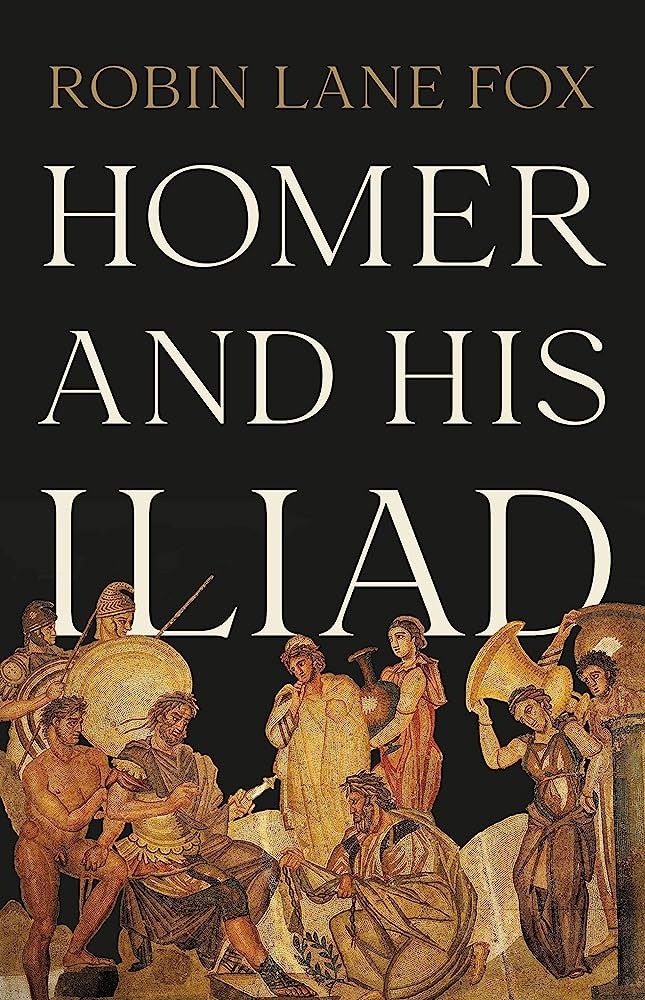Book Review: "Homer and His Iliad"
Robin Lane Fox's new book sheds fascinating and enriching light on one of western literature's greatest works.
Like many people my age, my first experience of The Iliad was in high school. Even though many of the ancient poem’s richness no doubt eluded my adolescent mind, I still knew there was something about it that drew me in, and I suspect it is at least partially responsible for my enduring love of and fascination with antiquity. When I saw that NetGalley had a copy of Homer and His Iliad, by the noted Oxford historian and classicist Robin Lane Fox–whose works I have much enjoyed in the past–I immediately requested one. And, as soon as I sat down and started reading it, I found myself completely enthralled.
What Fox has given us is a rich, textured, and erudite examination of Homer’s magnificent poem, and it will soon come, I think, to be regarded as one of the best guide’s to one of western literature’s most beloved and influential literary works. Fox’s obvious love for Homer shines through every chapter of the book, whether he’s discussing the topography that the poet drew on as he created his awe-inspiring story about the wrath of Achilles and its impact on the armed efforts of the Greeks or the way that the poem gives a remarkably empathetic insight into the lives of its women, particularly Helen, Hecuba, and Andromache.
Among other things, Fox offers his own interpretation of the authorship question, one of the most contentious issues within Homeric scholarship. He proposes that there was, in fact, one author of the poem, that he likely composed while he was singing, and that the poem might have been written down by his descendants. In formulating this theory, Fox draws not only on aspects of the poem itself but also on anthropological studies that have pointed out how various groups have undertaken a similar compositional process. Fox also argues, compellingly, I think, that The Iliad shows evidence of Homer having actually visited the site of Troy itself. The level of detail that the speaker evokes time and again shows, Fox argues, an intimate familiarity with the terrain that could only have emerged from someone who had actually been there.
What I found particularly useful about Homer and His Iliad is the extent to which it breathes fresh life into the poem itself. Even if you’ve read it dozens of times in all of its many translations (for me, Lattimore’s remains my favorite), there’s always something new to appreciate, some new facet that is just waiting to be brought into the light. I appreciated the depth with which Fox engaged with his subject, pointing out both the expected elements of the poem–Achilles’ wrath, the nature of the gods, the world that the poem depicts with such detail, its clever and subtle use of language–and also those elements which some might not have always paid attention to. In this regard, I particularly appreciated his attention to the women in the poem, for while The Iliad isn’t quite as finely attuned to the experiences and mindsets of its female characters as, say, The Odyssey, there are still some key moments when their voices can be heard even amid the din of battle.
Fox concludes his book with a discussion of the powerful pathos that remains one of the most extraordinary things about The Iliad. Though it is of course very much about the anger of Achilles and the meddling of the gods and the thrill and brutality and ugliness of battle, it is also about feeling, about allowing us to see how heavy weights the hand of fate on the great and the small alike. From Fox’s point of view, the sense of pathos is made even more wrenching by the fact that so much of the poem is premised on a certain level of dramatic irony, in that the characters labor without the knowledge that we, the readers/listeners, possess.
A word to the wise, however. There are times when Fox does get a bit deep into the weeds when it comes to examining The Iliad. While a thorough knowledge of the poem isn’t absolutely necessary to appreciate his work, it definitely helps to have read it at least somewhat recently. Nevertheless, despite this, there is still a great deal in Fox’s book that is sure to appeal to both classicists and laypeople alike. It will open your eyes to new avenues of appreciation for one of the great works of western literature. If, like me, The Iliad has always been one of your favorite texts, then I think you will find much to reward you in Homer and His Iliad. And if you have yet to fully explore its depths and its thematic and linguistic richness, then you couldn’t ask for a better guide to Homer’s genius than Robin Lane Fox.




